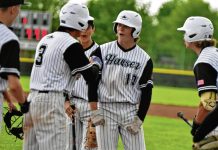Nick Hamilton of Danville captured the 20th annual Rumble on Fort Wayne finale at the Allen County Memorial Expo Center on Saturday.
It was the 20-year-old’s first win in the event. Columbus’ Tony Stewart finished sixth.
“I was raised watching races at Fort Wayne, and this has been a lifelong dream of mine,” Hamilton said. “It’s definitely a surreal feeling to know that it actually happened tonight. … I didn’t care if I won or my brother won; I just wanted one of us to get the trophy tonight, and I’m so blessed that I could get the job done.”
“A lot of guys on these bigger teams … have resources that we don’t. We do this as a family deal — me, my mom and dad and my brother — and it makes it that much more special when you can beat the big guys that dominate this deal time and time again. I don’t know how I held them all off at the end; I knew Nuckles was beating my door down, but thankfully I was able to hold on.”
Kyle O’Gara finished second, followed by Kody Swanson, Bryan Nuckles, and Travis Welpott.
On Dec. 29, veteran driver Russ Gamester became the oldest driver to ever win the annual event conducted indoors at Fort Wayne. Gamester started from the outside pole, grabbed the advantage from pole-sitter Jim Anderson on the initial start and never looked back. He led all 50 laps to score his fourth-career Fort Wayne victory in the headlining national midget class.
The win allowed Gamester to break his own record for the oldest winner in event history, resetting the mark at 52 years, 11 months and 20 days old after he also won on opening night in 2016.
“I knew if I didn’t get to the lead on the start, that I was in trouble,” Gamester said. “Luckily it worked out for us … and we were able to pull away from there.”
Mike Fedorcak finished second, followed by Bryan Nuckles, Joe Liguori and defending race-winner Kyle Hamilton.
Stewart was making a bid for second place with 11 laps into the Friday Night event when he was involved in a spin with a couple of other cars. Fedorcak, who built the Munchkin car that Stewart drove, barely escaped the incident and went on to finish in second place.
Chili Bowl next weekend
The 32nd annual Lucas Oil Chili Bowl Nationals presented by General Tire starts Monday with a special practice session for the midget-car drivers who will be participating in the weeklong racing festivities. There will be qualifying preliminary events each night starting Tuesday, with the big finale set for Jan. 13. A total of 342 cars currently are entered for the event.
The event at the Tulsa Expo Raceway located in the River Spirit Expo Center in Tulsa, Oklahoma, annually draws the biggest names from all forms of racing to the quarter-mile track. Drivers from dirt, asphalt, midgets, sprint cars, late models, NASCAR, etc. will congregate to the event. The finale wil be broadcast for the first-time ever in HD on MAV-TV and LucasOilRacingTV.
The Keith Kunz/Curb Agajanian Race Team based out of Columbus has won the last four Chili Bowl driller trophies. Those drivers include the defending race winner and 2017 NASCAR Camping World Truck Series driver, Christopher Bell, 2-time winner Rico Abreu (2016 and 2015) and the late Bryan Clauson on 2014.
Kunz also has gone to Victory Lane at Tulsa with Tony Stewart (2002), Jay Drake (2001), and Andy Hillenburg in 1994 for an impressive seven overall wins in the event. Kunz’ team manager, Pete Willoughby of Columbus, won the event as a car owner in 1998 with Sammy Swindell behind the wheel.
Stewart, a two-time winner of the event (2002 and 2007), is currently not pre-entered for this year’s race; however, Stewart most likely will play a significant role in track prep as he has done in recent Chili Bowl races.
One of the issues that race officials are forced to address for this year’s event is tire doping. One of the biggest side effects of tire doping is its effect on the racing surface. The chemicals damage the racetrack and make keeping a consistent surface difficult. For that reason, tire samples will be taken during the week.
There will be a designated area at the top of the ramp, and cars will be stopped at random throughout the event. Teams who are stopped will need to provide their own tire groover. This is to avoid any possible cross-contamination.
If a team refuses to have a sample taken, they will be disqualified. All samples will be documented, logged, and a serial number will be used with individual samples placed in a tamper-proof bag and sealed. A copy of the serial number will be given to the team for proper documentation. If a team is found to be doping their tires, a suspension of one year from competition at the Chili Bowl Nationals will be levied.
For more information go to chilibowl.com.
James Essex writes a motorsports notebook for The Republic. Send comments to [email protected].




